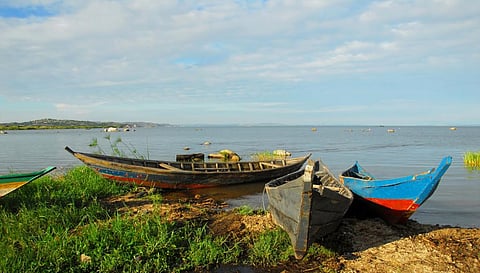

Lake Victoria, the largest freshwater lake in Africa and world’s second-largest, faces numerous environmental challenges that demand collective efforts for restoration and conservation. India-based think tank Centre for Science and Environment (CSE) and National Environment Management Council (NEMC), Tanzania conducted a multination stakeholder consultation in Dar es Salaam on January 23, 2024 to decide on strategies to restore the lake.
Lake Victoria and its flora and fauna support the livelihoods of about 45 million people. The fragile ecosystem of the heavily polluted lake could be damaged irreversibly in the absence of appropriate interventions.
CSE and NEMC have been working together for several years to develop a strategy to improve the water quality of Lake Victoria. Three countries share the lake’s resources for fisheries, freshwater and transportation: Tanzania (51 per cent), Uganda (44 per cent) and Kenya (5 per cent). The January 23 event was attended by regulators from Kenya, Tanzania, Burundi, Uganda and Rwanda.
Representatives from Rwanda Environment Management Authority, Burundi’s Ministry of Environment, Agriculture and Livestock, Uganda’s National Environmental Management Authority and Kenya’s National Environmental Management Authority all attended the event.
Participants from Tanzania included the NEMC, the Lake Victoria Basin Commission (LVBC), the Mwanza Urban Water Supply and Sanitation Authority (MWAUWASA), the Lake Victoria Basin Water Board, the Municipal City Council, Ministry of Water and regional offices located within the lake’s Tanzanian watershed.
The meeting discussed current initiatives to improve the lake’s water quality as well as future activities. It also attempted to comprehend the challenges confronting the countries that share the Lake Basin, as well as the strategies they intend to employ to restore the lake.
While the countries that share the lake and its basin are taking a variety of measures, CSE’s Nivit Kumar Yadav, programme director for industrial pollution unit, believes that strengthening regional environmental initiatives is critical to achieving the desired outcome of restoring the lake’s quality.
“It is precisely for this reason that we expanded the stakeholder participation to include Burundi and Rwanda, in addition to Kenya, Uganda and Tanzania. The aim has been to provide a platform for brainstorming on cross-country collaborative actions and a shared vision and learning,” Yadav added.
Hilda Luoga, project development officer for LVBC, spoke at the consultation and praised CSE’s efforts to address “the complex challenges faced by Lake Victoria, including pollution from various sources, unsustainable land use practices and inadequate sanitation.”
“This initiative plays a crucial role in complementing the LVBC’s mandate of ensuring the sustainable management of Lake Victoria and its basin,” she said.
In January 2023, CSE and NEMC released a report, Developing an Environmental Management Strategy for Lake Victoria, which identified Mwanza town in Tanzania as a hotspot area discharging industrial effluents and municipal and solid waste into the lake.
The organisations earlier released a management strategy to clean the lake and sustain its ecological integrity in Dar es Salaam, Tanzania on July 13, 2022. The research and analysis laid a roadmap for improving the water quality of Lake Victoria and making its use sustainable.